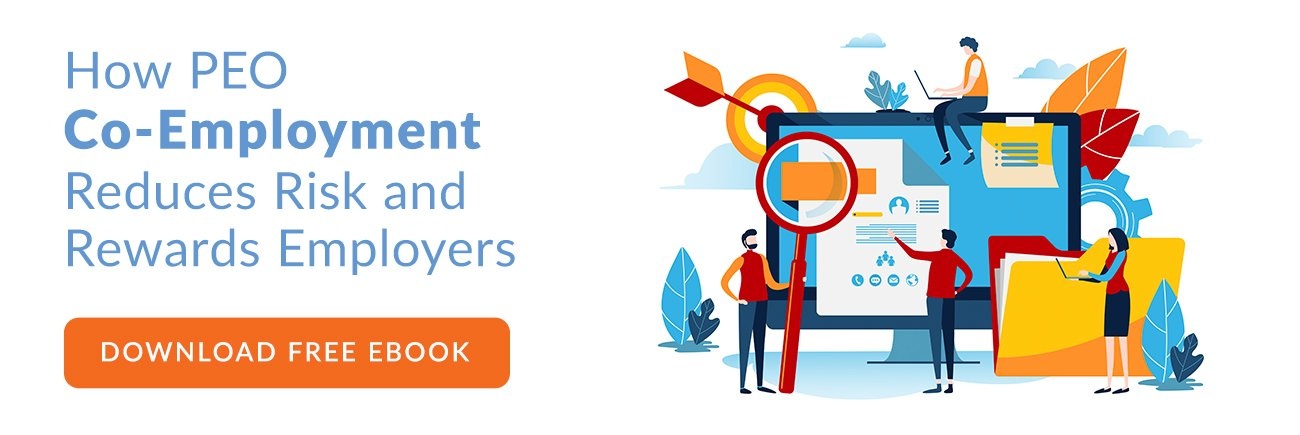Payroll is the most commonly outsourced HR function, but on its own, it doesn't provide a lot in the way of time and cost savings. It's essential to go beyond that. When partnering with a professional employer organization, you get PEO payroll services and so much more. While PEOs specialize in payroll, they provide many more services at the same time.
What is a PEO?
A PEO is a model for HR outsourcing that carries a particularly high ROI. The reason for this is that it uses a legal tool called co-employment. Under the co-employment model, the PEO becomes the employer of record for your employees.
Don't worry, this doesn't impact day-to-day decision-making for your worksite employees. Rather, it allows the PEO to act as an employer for tax remittance purposes. This gives numerous benefits, allowing you to save more time over typical payroll processors. Co-employment also saves money on health benefits, retirement benefits, workers' compensation, etc.
What are PEO Payroll Services?
PEO payroll services outsource payroll duties to a professional employer organization. This allows the PEO to calculate and withhold your payroll taxes at all levels, including local taxes where relevant. They can then electronically deposit the taxes for you.
They will also process end of year W2s and even 1099s for contractors. Your employees will be paid via convenient direct deposit.
They can also automatically deduct and deposit HSA deductions for your employees and ensure that the money ends up in the right account. Furthermore, the best PEOs use consolidated HR software that integrates payroll with time and attendance (reducing errors significantly) and other aspects of HR maintenance.
What is the Difference Between PEO Payroll Services and a Payroll Processor?
There are two major differences. The first is that while a payroll processor can tell you how much you owe in payroll taxes, only a PEO can remit the taxes for you. Thanks to co-employment, they file all the payroll taxes under their Federal Employment Identification Number (FEIN). This means that you gain further time saving from not having to file employment taxes.
Additionally, PEOs provide a suite of additional services beyond payroll, increasing cost and time savings and greatly improving your ROI.
What Other Services do PEOs Provide?
PEOs are a full-service HR outsourcing model. This means that working with a PEO gets you access to all the other things they do, which make a huge difference. Your HR team is free to handle the tasks you really need their specific expertise for, such as handling employee professional development, recruiting top talent, and mediating disputes. Here are some ways a PEO can help you:
Access Better Employee Benefits
Affording competitive health insurance is a major challenge for many small to medium-sized businesses. By partnering with a PEO, you give your employees access to the PEO’s master health plan. As this plan is shared with all of their clients, you will get improved economies of scale, and the impact of individual claims is reduced which keeps premiums lower.
Remove Administrative Burdens
If you run a smaller business, your HR team (or HR person) is likely to be overburdened.
By taking care of payroll, benefits administration, and HR compliance, the PEO removes many of these administrative burdens. This allows your HR team to devote their time to things that strategically benefit your company. It also improves their morale by rescuing them from tedious paperwork.
Control Workers' Compensation Costs
A key determinant of your workers' compensation premiums is your experience modifier. This can shoot up if you get so much as a single claim.
A best-in-class PEO will lower your experience modifier by adding your employees to a plan with other clients in the same industry. This allows you to benefit from their experience modifier. Also, the more employees you have on a plan, the less each individual claim will impact the rate. Finally, PEOs can offer the benefit of their experience to help you design safety training programs to reduce the number of claims made. You can also set up return-to-work programs to reduce the amount of each claim.
You can also get pay-as-you-go coverage instead of having to pay everyone's premiums in an upfront lump sum that is estimated by the insurance company. While you might get some of this money back, it's not helpful for cash flow. PEOs pay the lump sum so that you only have to cover premiums month-to-month.
Implement Risk Management Best Practices
Risk management is something a lot of newer companies find particularly challenging. A PEO can offer the benefit of their experience to help you manage risk and reduce costs. This includes:
- Helping with worksite safety audits and safety training to ensure that you are not only OSHA compliant but doing your best for your employees.
- Optimizing your workers' compensation so that you focus on the right elements to keep rates low and manage claims.
- Ensuring HR compliance and making sure you post the right signs to stay compliant.
- Managing unemployment claims to speed processing, reduce claims, and reduce turnover in general.
- Keeping payroll error-free.
Risk management is a key part of saving money for all businesses. It helps support your reputation both amongst prospective customers and prospective employees.
The advantages of outsourcing to a PEO go far beyond what we can present here. To find out more about how working with a PEO can help your company, download our eBook "How PEO Co-Employment Reduces Risk and Rewards Employers."



